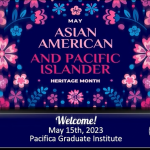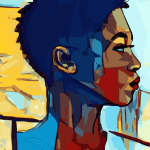
2023 Abakanowicz Fellowship Awardees
The Abakanowicz Arts and Culture Charitable Foundation (AACCF), in collaboration with Pacifica Graduate Institute Alumni Association, is pleased to announce the 2023 Abakanowicz Community and Ecological Fieldwork and Research Fellowships.
AACCF was established in 2018 to promote the legacy of Magdalena Abakanowicz and to fund programs that investigate concepts of human creativity, the role of art as a visual language within cultures and a dynamic force within contemporary society, and the intersection of art and other modes of inquiry for the purposes of extending the meaning and relevance of Abakanowicz’s art and its underlying ideas. Applicants must be a second-year, third-year, or dissertation student in good standing with the Community, Liberation, Indigenous, and Ecopsychology (CLIE) Program at Pacifica Graduate Institute.
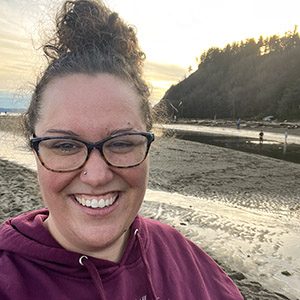 Stevie Myer
Stevie Myer
My summer research is dedicated to my Qagan Tayagungin and European Immigrant foremothers, entitled The Wisdom of Ayagum Inulaĝa (beloved children in Unangam Tunuu)-Revealing the Relationship of Children’s Autonomous Cultural Learning to Indigenous Eco-Soul Centric Community. The praxis is inspired by the wonder and excitement I felt and witnessed when my three children (Cora, Carden and Fin) first beheld cartoon drawings I created of each of them in regalia, playing drums and dancing. My children and I will be adapting traditional child led environmental and cultural learning as displaced Unangan in Washington State to our mostly assimilated American lives and traditions. We will gather, play, and engage in circle with local Unangan families on the child-led research topics as well as volunteer at the annual Unangan Culture Camp and Picnic in Snohomish County. This research is an act of indigenous ontofugitivity (adopted from the works of Bayo Akomolafe), a refusal to continue mainstream American education through tutoring, at home curriculum, rigid scheduling and colonial parenting practices throughout summer break for fear of “falling behind” and “spoiling our children.”
I am a wife, mother, daughter, sister, friend, multipotentialite, who prefers to sense the world through bare feet. I adore art in many forms; yet, do not claim the title artist. My path is found through sensations in my body and meaning making that comes at its own pace through visions, lyrics, laughter, and play—often in hindsight after much frustration and impatience. I am the Communications Director for Pacific Northwest Aleut (Unangan) Council and Leader of a local Girl Scout Troop in the final months of my second year at Pacifica in the Community, Liberation, Indigenous, and Eco Psychology track. Qagaasakuq for this incredible opportunity.
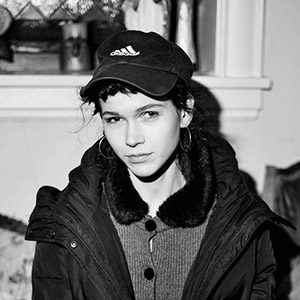 Carrie Thomas
Carrie Thomas
Carrie Thomas is an artist and musician based in Minneapolis, Minnesota on Dakota land. Before joining the CLIE program, her life’s work was centered around prison abolition, grassroots ecologies of care, pipeline resistance efforts, and playing in bands. Carrie’s current research looks at how spiritual technologies like divination and ritual performance maintain reciprocal relationships with the other-than-human world. She is also interested in d.i.y. underground arts communities/ networks as sites of liberatory theory and praxis and hopes to weave this lived experience into future projects.
For her proposed fieldwork, Carrie will study the percussive rhythms, dances and rites that are used to venerate the Black Madonna in the Campania region of southern Italy. A syncretic deity, the Black Madonna is an amalgamation of preChristian goddesses that were folded into the Catholic pantheon during the era of Christian conquest. In this way, the subaltern classes were able to maintain connections to their indigenous land-based spiritual traditions without being charged with heresy. The chants and rituals that are performed in her honor have been endorsed by her followers for their ability to heal trauma, loss and addiction. The Black Madonna is also a long-standing patron and protector of women and third gender people and articulates a deeply embedded cultural memory of what E.B. Bynum calls the “African unconscious”. Carrie’s research will consider questions around the Black Madonna as a decolonial archetype– what fugitive values, knowledges and messages does she carry with her?
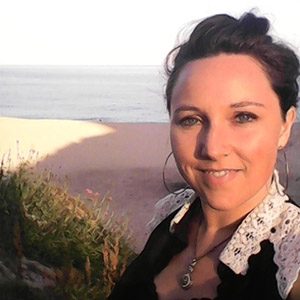 Hana Truscott
Hana Truscott
The Reimagining Whiteness Community Lab and Podcast study will explore the research questions: how do we collectively reimagine whiteness? What themes emerge when we have a creative collective container in which to reimagine whiteness? The hope for the community lab focus group is to create a container (i.e., a space informed by counter-modernity) in which to share stories, dream up new imaginings for what whiteness can look like, identify emergent themes, and begin co-creating a podcast within a community of co-researchers. The hope for the podcast is to share those stories, emergent themes, and co-created imaginings with the public. The purpose of this qualitative study will be to raise consciousness and ultimately inspire transformation in how whiteness is embodied and acted out in the world by dreaming up new imaginings for what whiteness can look like from many angles, including but not limited to illuminating a cultural soul wound of white settler communities (i.e. white folks) specifically as it relates to being uprooted from ancestral roots to assimilate into whiteness, reclaiming ancestral roots as a possibility for healing the soul wound, transforming difficult emotions into meaningful action when facing legacies of harms caused by whiteness, and dreaming emergent “third-consciousness” from BIPOC perspectives that build on DuBois’ “double-consciousness” concept.
Hana is a 2nd year graduate student of Depth Psychology in PGI’s Community, Liberation, Indigenous, and Eco-Psychologies Specialization. Her research involves reimagining whiteness, reclaiming pre-colonial ancestral roots in Suomi (Finland), Hrvatska (Croatia), and Kernow (Cornwall), and illuminating a cultural soul wound created (at least in part) by her European-immigrant ancestors’ assimilation into whiteness. She is a storyteller seeking to heal intergenerational and ancestral trauma and contribute to a shift in human consciousness.



